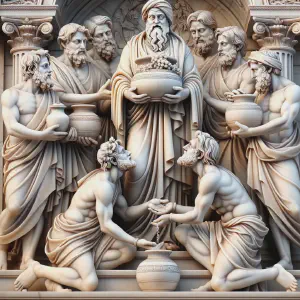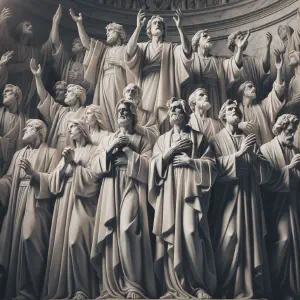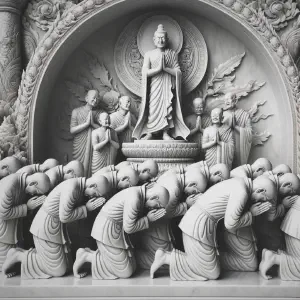The Obedient Servant: From Sin to Salvation




Five Questions
What significance does the introduction of sin by one man have on humanity, as depicted in Romans 5:12?
The introduction of sin by one man, commonly understood as Adam, signifies the fall of humanity. It demonstrates how a single act can have a cascading effect, leading to consequences for all. Through Adam’s transgression, death entered the world, affecting every human being. This foundational sin established the need for redemption.
The scripture mentions the “gracious gift of the one man Jesus Christ.” How does this contrast with the transgression of the first man?
The contrast is stark. While the first man’s transgression brought condemnation, Jesus Christ’s righteous act offers a path to acquittal and life. His sacrifice and obedience counterbalance the effects of the original sin. Where sin and death once reigned, now grace and eternal life become accessible through Jesus.
The Responsorial Psalm emphasizes obedience to God’s will. How does this relate to the main theme of the reading from Romans?
The Psalm underscores the value of obedience to God, which is a central theme in the reading from Romans. Just as Jesus’s obedience led to righteousness and salvation for many, the psalmist expresses a deep desire to fulfill God’s will. The connection suggests that true devotion isn’t merely about rituals or sacrifices but genuine obedience from the heart.
Jesus’s parable in Luke 12 speaks of servants awaiting their master’s return. How does this narrative fit into the broader message of redemption and vigilance?
Jesus’s parable serves as an allegory for believers. Just as the servants are vigilant, awaiting their master, believers are called to be prepared for Jesus’s return. The message emphasizes the importance of steadfastness in faith and being ready at all times. Those who remain vigilant and obedient, like the servants, will be rewarded, tying back to the themes of redemption and the transformative power of obedience.
Lastly, what lesson can modern-day believers derive from these scriptures about the role of obedience in their spiritual journey?
The scriptures highlight that obedience is a cornerstone of faith. Whether it’s the obedience of Jesus leading to salvation or the psalmist’s desire to fulfill God’s will, believers are reminded that true devotion goes beyond rituals. It’s about aligning one’s heart and actions with God’s commands. In today’s context, it serves as a call to remain steadfast, embrace righteousness, and always be prepared for the divine encounters in our journey.
Bible Study
Reading 1: Rom 5:12, 15b, 17-19, 20b-21
Brothers and sisters:
Through one man sin entered the world,
and through sin, death,
and thus death came to all men, inasmuch as all sinned.If by that one person’s transgression the many died,
how much more did the grace of God
and the gracious gift of the one man Jesus Christ
overflow for the many.
For if, by the transgression of the one,
death came to reign through that one,
how much more will those who receive the abundance of grace
and the gift of justification
come to reign in life through the one Jesus Christ.
In conclusion, just as through one transgression
condemnation came upon all,
so, through one righteous act
acquittal and life came to all.
For just as through the disobedience of one man
the many were made sinners,
so, through the obedience of the one
the many will be made righteous.
Where sin increased, grace overflowed all the more,
so that, as sin reigned in death,
grace also might reign through justification
for eternal life through Jesus Christ our Lord.
This passage from Romans offers a profound theological reflection on the nature of sin and redemption. The “one man” referred to is Adam, whose original sin brought condemnation to all of humanity. This sin led to spiritual death. Yet, there’s a contrast made with Jesus Christ, who, through His obedience and sacrifice, offers grace, justification, and eternal life to all. This aligns with Catholic values emphasizing the power of God’s grace to redeem and the importance of obedience to God’s will, as found in the Ten Commandments and the Catechisms.
Responsorial Psalm: Ps 40:7-8a, 8b-9, 10, 17
R. (8a and 9a) Here I am, Lord; I come to do your will.
Sacrifice or oblation you wished not,
but ears open to obedience you gave me.
Burnt offerings or sin offerings you sought not;
then said I, “Behold I come.”
R. Here I am, Lord; I come to do your will.
“In the written scroll it is prescribed for me,
To do your will, O my God, is my delight,
and your law is within my heart!”
R. Here I am, Lord; I come to do your will.
I announced your justice in the vast assembly;
I did not restrain my lips, as you, O LORD, know.
R. Here I am, Lord; I come to do your will.
May all who seek you
exult and be glad in you,
And may those who love your salvation
say ever, “The LORD be glorified.”
R. Here I am, Lord; I come to do your will.
The psalmist expresses a deep desire to fulfill God’s will, indicating that mere rituals or sacrifices are not what God desires most, but genuine obedience from the heart. This notion of inner devotion aligns with the Catholic Church’s teachings on the importance of internal conversion and the Acts of Mercy, which prioritize love and genuine care over mere ritualistic practices.
Alleluia: Lk 21:36
R. Alleluia, alleluia.
Be vigilant at all times and pray
that you may have the strength to stand before the Son of Man.
R. Alleluia, alleluia.
This passage calls believers to always be vigilant and in constant prayer, preparing themselves for the eventual return of Jesus, the Son of Man. It’s a reminder of the Catholic value of remaining steadfast in faith and the need for grace to endure challenges and temptations.
Gospel: Lk 12:35-38
Jesus said to his disciples:
“Gird your loins and light your lamps
and be like servants who await their master’s return from a wedding,
ready to open immediately when he comes and knocks.
Blessed are those servants
whom the master finds vigilant on his arrival.
Amen, I say to you, he will gird himself,
have them recline at table, and proceed to wait on them.
And should he come in the second or third watch
and find them prepared in this way,
blessed are those servants.”
In this Gospel passage, Jesus uses a parable to teach about the importance of being prepared for His second coming. The master symbolizes Jesus, while the servants represent all believers. Those who remain vigilant and prepared are blessed and rewarded. This teaching is in alignment with the Catholic Church’s emphasis on the importance of being spiritually prepared for the end times and the doctrine of the Second Coming of Christ.
Lessons
In the profound wisdom of these scriptures, we are gently reminded of the overarching narrative of God’s boundless love and mercy for humanity. Through the transgressions of one, sin entered the world, but through the selfless sacrifice of Jesus Christ, redemption and eternal life are offered to all. The psalmist’s heartfelt devotion underscores that it is not mere rituals God desires, but a genuine, obedient heart. Furthermore, our Lord Jesus, through His parable, emphasizes the significance of vigilance and preparedness in our spiritual journey. As humble servants of the Lord, we are called to internalize these lessons, embodying a life of unwavering faith, deep love, and earnest anticipation for the Lord’s divine call.
Meditation Prayer
O Merciful Lord,




In response to Your word, we commit ourselves to be vigilant in our faith, ever-prepared for Your divine call. May we be the bearers of Your message, spreading love, understanding, and hope to every soul we encounter.
In Jesus’ name, we pray.
Amen.